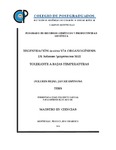| dc.contributor.author | Javier Espinosa, Dolores Mijail | |
| dc.creator | JAVIER ESPINOSA, DOLORES MIJAIL; 437778 | |
| dc.date.accessioned | 2019-07-23T17:12:43Z | |
| dc.date.available | 2019-07-23T17:12:43Z | |
| dc.date.issued | 2016-12 | |
| dc.identifier.uri | http://hdl.handle.net/10521/3628 | |
| dc.description | Tesis (Maestría en Ciencias, especialista en Genética).- Colegio de Postgraduados, 2016. | es_MX |
| dc.description.abstract | El jitomate es una de las hortalizas de mayor consumo a nivel mundial debido a que su fruto es una fuente rica en vitaminas, minerales y antioxidantes. Su cultivo puede ser afectado por diversos factores como plagas y enfermedades, pero las bajas temperaturas también pueden causar efectos negativos. Esta investigación tuvo como objetivos establecer la regeneración in vitro de plantas de tres colectas de tomate silvestre tipo Cherry vía organogénesis y evaluar su tolerancia a bajas temperaturas. A partir de semillas se logró el establecimiento del cultivo aséptico sumergiéndolas en una solución de NaOCl (30%) por 15 min. La germinación fue de 60 % y ocurrió después de una semana en las tres colectas en medio MS a la mitad de concentración de sales. Los mejores resultados durante la inducción de brotes se logró a partir de yemas apicales cultivadas en medio MS suplementado con 2.5 mg L-1de BAP. Sin embargo, el número de brotes varía entre colectas. En la colecta Núm. 300 se obtuvieron 2.8 brotes por explante, 2.6 brotes en la colecta Núm. 457 y 1.8 brotes en la colecta Núm. 367. La multiplicación de brotes en las tres colectas de jitomate (3.5 brotes por explante promedio) se logró con 0.5 mg L-1 de cinetina y 0.1 mg L-1 de ANA. El enraizamiento in vitro se indujo rápidamente después de ocho días de cultivo en el medio MS a la mitad de concentración de sales sin reguladores de crecimiento. Durante la aclimatación la supervivencia de plantas fue de 85% cuando se transfirieron en macetas con una mezcla de sustrato de turba y vermiculita (1:1) después de dos semanas. En la evaluación a bajas temperaturas (-8 ºC) se confirmó que la tolerancia de las plántulas in vitro de las tres colectas de jitomate está asociada con un origen genético. En general, las tres colectas resultaron tolerantes y la supervivencia se comportó inversamente proporcional con el tiempo de exposición. _______________ In vitro REGENERATION VIA ORGANOGENESIS OF Solanum lycopersicum Mill TOLERANT TO COLD TEMPERATURES. ABSTRACT: The tomato is one of the most consumed vegetables worldwide, because its fruit is a rich source of vitamins, minerals and antioxidants. Its cultivation and production can be affected by various factors such as pests and diseases, but low temperatures can also cause negative effects. This research aimed to establish the in vitro plant regeneration of three collections of wild Mexican tomato Cherry via organogenesis and determinate their tolerance to low temperatures. Aseptic culture was achieved when seeds were cleaned in a solution of NaOCl (30%) for 15 min. Germination (60%) occurred after one week on MS medium at half salt concentration in the three collects. The best results during shoot induction were obtained when apical buds were used as explants and cultured on MS medium supplemented with 2.5 mg L-1 BAP. However, the number of shoots produced varied according the collect. In collection No. 300 2.8 buds per explant were obtained, 2.6 shoots in collection No. 457 and 1.8 shoots in collection 367. Shoots multiplication in the three collections of tomato (3.5 shoots per explant average) was achieved with 0.5 mg L-1 kinetin and 0.1 mg L-1 NAA. In vitro rooting was rapidly induced after 8 days of culture on MS medium with half salt concentration without growth regulators. Acclimatization of plants was successful (85%) in peat-moss and vermiculite substrate (1:1) after two weeks. Evaluation of tolerance to low temperatures (-8 ° C) to evaluate their performance we confirmed that the tolerance of the three accessions is associated with a genetic origin. In general, plant tolerance and survival showed inversely proportional to the exposure time. | es_MX |
| dc.description.sponsorship | Consejo Nacional de Ciencia y Tecnología (CONACyT). | es_MX |
| dc.format | pdf | es_MX |
| dc.language.iso | spa | es_MX |
| dc.rights.uri | http://creativecommons.org/licenses/by-nc-nd/4.0 | es_MX |
| dc.subject | Cherry | es_MX |
| dc.subject | Micropropagación | es_MX |
| dc.subject | Estrés | es_MX |
| dc.subject | Tolerancia | es_MX |
| dc.subject | Frío | es_MX |
| dc.subject | Micropropagation | es_MX |
| dc.subject | Stress | es_MX |
| dc.subject | Tolerance | es_MX |
| dc.subject | Cold | es_MX |
| dc.subject | Genética | es_MX |
| dc.subject | Maestría | es_MX |
| dc.subject.classification | CIENCIAS AGROPECUARIAS Y BIOTECNOLOGÍA::CIENCIAS AGRARIAS::AGRONOMÍA::GENÉTICA VEGETAL | es_MX |
| dc.title | Regeneración in vitro vía organogénesis de Solanum lycopersicum Mill tolerante a bajas temperaturas. | es_MX |
| dc.type | Tesis | es_MX |
| Tesis.contributor.advisor | López Peralta, Ma. Cristina Gpe. | |
| Tesis.contributor.advisor | Ramírez Vallejo, Porfirio | |
| Tesis.contributor.advisor | Livera Muñoz, Manuel | |
| Tesis.contributor.advisor | Estrada Luna, Andrés Adolfo | |
| Tesis.date.submitted | 2016-12 | |
| Tesis.date.accesioned | 2017 | |
| Tesis.date.available | 2017 | |
| Tesis.type | Tesis | es_MX |
| Tesis.format.mimetype | pdf | es_MX |
| Tesis.format.extent | 2,758 KB | es_MX |
| Tesis.subject.nal | Organogénesis | es_MX |
| Tesis.subject.nal | Organogenesis | es_MX |
| Tesis.subject.nal | Variabilidad | es_MX |
| Tesis.subject.nal | Variability | es_MX |
| Tesis.subject.nal | Micropropagación | es_MX |
| Tesis.subject.nal | Micropropagation | es_MX |
| Tesis.subject.nal | México | es_MX |
| Tesis.rights | Acceso abierto | es_MX |
| Articulos.subject.classification | Lycopersicon esculentum | es_MX |
| dc.type.conacyt | masterThesis | es_MX |
| dc.identificator | 6||31||3103||241714 | es_MX |
| dc.contributor.director | LÓPEZ PERALTA, MARIA CRISTINA GUADALUPE; 3082 | |
| dc.audience | generalPublic | es_MX |


